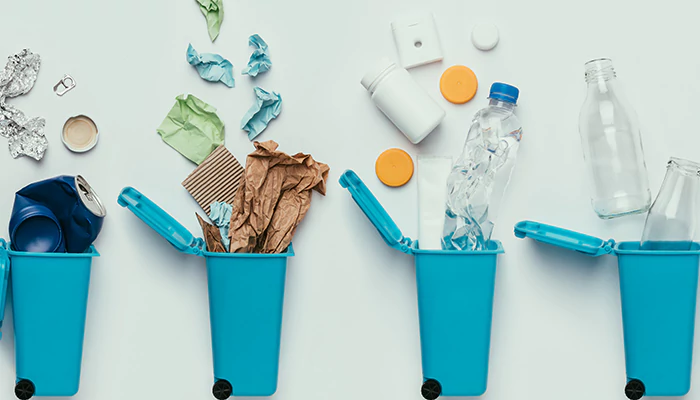Transforming Your Kitchen into a Plastic-Free and Sustainable Haven
Welcome to the heart of your home, the kitchen! This vibrant space isn't just where meals are prepared; it’s where memories are made, conversations flow, and daily rituals unfold. However, the prevalence of plastic in our kitchens has become a significant environmental concern. From packaging to utensils, plastics are everywhere. The good news? Transitioning to a plastic-free and sustainable kitchen is easier than you might think. Here are some practical tips to make your kitchen greener and kinder to the planet.
- Elisa Ghosh
- 04 June, 2025
- 2 mins ago

Transforming Your Kitchen into a Plastic-Free and Sustainable Haven
Welcome to the heart of your home, the kitchen! This vibrant space isn't just where meals are prepared; it’s where memories are made, conversations flow, and daily rituals unfold. However, the prevalence of plastic in our kitchens has become a significant environmental concern. From packaging to utensils, plastics are everywhere. The good news? Transitioning to a plastic-free and sustainable kitchen is easier than you might think. Here are some practical tips to make your kitchen greener and kinder to the planet.
The Problem with Plastics
Before we delve into solutions, it's essential to understand why reducing plastic in the kitchen is so crucial. Plastics are derived from petroleum, a non-renewable resource. They take hundreds of years to decompose, often ending up in landfills or the ocean, harming wildlife and ecosystems. Additionally, certain plastics can leach harmful chemicals into food and drinks, posing health risks. By minimizing plastic use, you contribute to environmental conservation and enhance your household’s well-being.

Embrace Reusable Containers
One of the simplest steps towards a plastic-free kitchen is swapping single-use plastic containers for reusable alternatives. Glass, stainless steel, and silicone options are excellent choices. Glass containers are versatile and can be used for storing leftovers, meal prepping, and even baking. Stainless steel is durable and perfect for carrying snacks and lunches. Silicone bags are a flexible and lightweight alternative to plastic zip-lock bags. These options not only reduce waste but also keep your food fresher for longer.
Opt for Bulk Buying
Purchasing groceries in bulk can significantly reduce plastic waste. Many stores now offer bulk sections where you can bring your own containers to fill with grains, nuts, spices, and more. This practice not only eliminates the need for plastic packaging but also often saves money. To make this easier, keep a set of cloth bags or glass jars handy for your shopping trips. By buying in bulk, you also reduce the number of trips to the store, saving on fuel and reducing your carbon footprint.
Choose Natural Cleaning Products
Many commercial cleaning products come in plastic bottles and contain harsh chemicals that can be harmful to the environment and your health. Switching to natural cleaning solutions can make a big difference. Vinegar, baking soda, and lemon are powerful, eco-friendly cleaners. You can make your own cleaning solutions and store them in glass spray bottles. Additionally, look for sustainable brands that offer refills or use minimal packaging.
Invest in Quality Cookware
Quality over quantity is a key principle in creating a sustainable kitchen. Invest in high-quality cookware that will last for years. Cast iron, stainless steel, and enamel-coated pots and pans are durable and free from harmful chemicals found in non-stick coatings. While they might require a higher initial investment, their longevity and performance make them cost-effective in the long run.
Shop Local and Seasonal
Supporting local farmers and buying seasonal produce can reduce the environmental impact of your food. Local produce often requires less packaging and transportation, cutting down on plastic use and carbon emissions. Visit farmers’ markets or join a CSA (Community Supported Agriculture) program to access fresh, seasonal, and locally grown food. This practice not only supports sustainable agriculture but also connects you with your community.
Ditch Plastic Wrap
Plastic wrap is a common kitchen staple, but there are plenty of sustainable alternatives. Beeswax wraps, made from cotton infused with beeswax, are reusable and biodegradable. They’re perfect for wrapping sandwiches, covering bowls, and keeping produce fresh. Silicone lids and fabric bowl covers are other great options. These products are washable and reusable, making them a smart investment for a sustainable kitchen.
Transitioning to a plastic-free and sustainable kitchen doesn’t happen overnight, but every small step counts. When making mindful choices about the products you use and the way you shop, you can significantly reduce plastic waste and promote a healthier environment. Turn your journey towards sustainability, knowing that each effort you make contributes to a cleaner, greener planet. Happy cooking, and here’s to a plastic-free kitchen!










